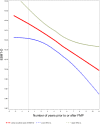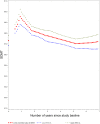Evidence for Cognitive Aging in Midlife Women: Study of Women's Health Across the Nation
- PMID: 28045986
- PMCID: PMC5207430
- DOI: 10.1371/journal.pone.0169008
Evidence for Cognitive Aging in Midlife Women: Study of Women's Health Across the Nation
Abstract
Although cross-sectional studies suggest that cognitive aging starts in midlife, few longitudinal studies have documented within-individual declines in cognitive performance before the seventh decade. Learning from repeat testing, or practice effects, can mask the decline in younger cohorts. In women, the menopause transition also affects test performance and can confound estimates of underlying decline. We designed this study to determine if, after controlling for practice effects, the menopause transition, and the symptoms associated with it, there is evidence of cognitive aging in midlife women. We used data from a longitudinal observational study in 2,124 participants from the Study of Women's Health Across the Nation. Outcomes examined were scores on annual tests of processing speed, verbal episodic memory (immediate and delayed), and working memory. To reduce the impact of practice effects and of the menopause transition, we used the third cognition testing visit as the baseline. Average age at this baseline was 54 years, and the majority of the women were postmenopausal; half the cohort was 2 or more years beyond the final menstrual period. There were 7,185 cognition assessments with median follow-up time of 6.5 years. In mixed effects regression, adjusted for practice effects, retention, menopause symtoms (depressive, anxiety, vasomotor, and sleep disturbance), and covariates, scores on 2 of 4 cognition tests declined. Mean decline in cognitive speed was 0.28 per year (95% confidence interval [CI] 0.20 to 0.36) or 4.9% in 10 years, and mean decline in verbal episodic memory (delayed testing) was 0.02 per year (95% CI: 0.00 to 0.03) or 2% in 10 years. Our results provide strong, longitudinal evidence of cognitive aging in midlife women, with substantial within-woman declines in processing speed and memory. Further research is needed to identify factors that influence decline rates and to develop interventions that slow cognitive aging.
Conflict of interest statement
The authors have declared that no competing interests exist.
Figures



References
-
- Deary IJ, Corley J, Gow AJ, Harris SE, Houlihan LM, Marioni RE, et al. Age-associated cognitive decline. British Med Bull 2009; 92: 135–152 - PubMed
-
- Schroeder DH & Salthouse TA. Age-related effects on cognition between 20 and 50 years of age. Personality and Individual Differences 2004; 36: 393–404
MeSH terms
Grants and funding
LinkOut - more resources
Full Text Sources
Other Literature Sources
Medical

